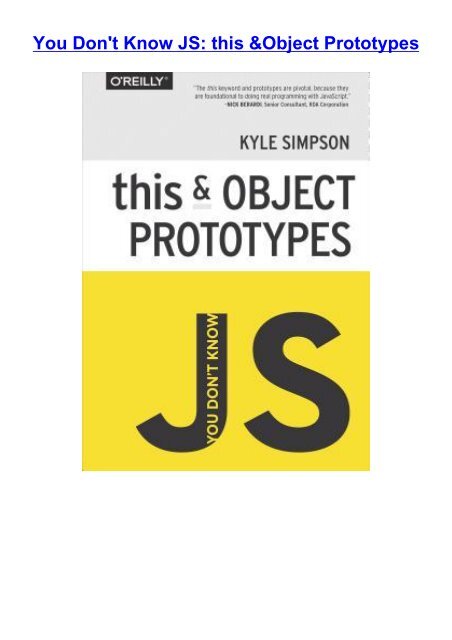You Don%27t Know Js Pdf Download
- You can write a book review and share your experiences. Other readers will always be interested in your opinion of the books you've read. Whether you've loved the book or not, if you give your honest and detailed thoughts then people will find new books that are right for them.
- You Don't Know JS: Up & Going PDF Free Download, Reviews, Read Online, ISBN:, By Kyle Simpson.
/cummins-insite-license-key-free.html. I teach all my workshops exclusively through Frontend Masters. If you like this book content, please check out my video training courses. I want to extend a warm and deep thanks to Marc Grabanski and the entire Frontend Masters team, not only for their excellent work with the video training platform, but for their unwavering support of me and of the 'You Don't Know JS' books! Look no further!The worldwide best selling 'You Don't Know JS' book series is back for a 2nd edition: 'You Don't Know JS Yet'. All 6 books are brand new, rewritten to cover all sides of JS for 2020 and beyond.' Get Started' prepares you for the journey ahead, first surveying the language then detailing how the rest of the You Don't Know JS Yet. No matter how much experience you have with JavaScript, odds are you don't fully understand the language. This concise yet in-depth guide takes you inside scope and closures, two core concepts you need to know to become a more efficient and effective JavaScript programmer. Download and read online in pdf, epub, tuebl and mobi format. The YOU DON'T KNOW JS series includes. Own mind if you don ' t know how to explain.
You Don 27t Know Js Pdf Download 64-bit


You Don 27t Know Js Pdf Download Pdf
You Don't Know JS: Async & Performance free PDF
Book Description
I'm sure you noticed, but 'JS' in the book series title is not an abbreviation for words used to curse about JavaScript, though cursing at the language's quirks is something we can probably all identify with! From the earliest days of the web, JavaScript has been a foundational technology that drives interactive experience around the content we consume. While flickering mouse trails and annoying pop-up prompts may be where JavaScript started, nearly 2 decades later, the technology and capability of JavaScript has grown many orders of magnitude, and few doubt its importance at the heart of the world's most widely available software platform: the web. But as a language, it has perpetually been a target for a great deal of criticism, owing partly to its heritage but even more to its design philosophy. Even the name evokes, as Brendan Eich once put it, 'dumb kid brother' status next to its more mature older brother 'Java'. But the name is merely an accident of politics and marketing. The two languages are vastly different in many important ways. 'JavaScript' is as related to 'Java' as 'Carnival' is to 'Car'. Because JavaScript borrows concepts and syntax idioms from several languages, including proud C-style procedural roots as well as subtle, less obvious Scheme/Lisp-style functional roots, it is exceedingly approachable to a broad audience of developers, even those with just little to no programming experience. The 'Hello World' of JavaScript is so simple that the language is inviting and easy to get comfortable with in early exposure. While JavaScript is perhaps one of the easiest languages to get up and running with, its eccentricities make solid mastery of the language a vastly less common occurrence than in many other languages. Where it takes a pretty in-depth knowledge of a language like C or C++ to write a full-scale program, full-scale production JavaScript can, and often does, barely scratch the surface of what the language can do. Sophisticated concepts which are deeply rooted into the language tend instead to surface themselves in seemingly simplistic ways, such as passing around functions as callbacks, which encourages the JavaScript developer to just use the language as-is and not worry too much about what's going on under the hood. It is simultaneously a simple, easy-to-use language that has broad appeal, and a complex and nuanced collection of language mechanics which without careful study will elude true understanding even for the most seasoned of JavaScript developers. Therein lies the paradox of JavaScript, the Achilles' Heel of the language, the challenge we are presently addressing. Because JavaScript can be used without understanding, the understanding of the language is often never attained.Book Details
Publisher: O'ReillyBy: Jake Archibald
Language: English
File size: 1.46 MB
File format: PDF